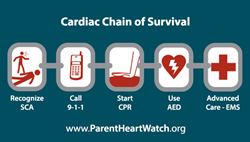
(PRWEB)
July 16, 2015
Parent Heart Watch (PHW), the national voice solely dedicated to protecting youth from sudden cardiac arrest and preventable sudden cardiac death, is commemorating its 10th anniversary by distributing “10 Lists of 10” throughout 2015 to raise awareness of sudden cardiac arrest (SCA) in youth.
July’s list focuses on the Top 10 Considerations for a Cardiac Emergency Response Plan for camps or sports leagues. According to PHW Board Chair, Martha Lopez-Anderson, having a written and well-practiced cardiac emergency response plan is key to properly executing the cardiac chain of survival. “Cardiac emergencies can occur while kids are having fun or playing the sport they love, so being prepared to respond is paramount and often makes the difference between life, death or permanent debilitating consequences.” The list below highlights the critical components of a good cardiac emergency response plan.
Top 10 Considerations for a Cardiac Emergency Response Plan
1. Implement a written Cardiac Emergency Response Plan (CERP) and communicate/distribute to camp personnel, coaches and sports officials.
2. Strategically place automated external defibrillators (AEDs) with a goal of less than 3 minutes from time of collapse to shock.
3. Make sure AEDs are readily accessible at all times.
4. Mark AED locations with three-dimensional universal AED signage so these are easily identified.
5. Have an AED on the sideline at all athletic events and practices.
6. Conduct regular maintenance of AED battery and pads to ensure readiness when needed.
7. Ensure that all camp personnel, coaches and sports officials know how to identify a cardiac emergency.
8. Train an adequate number of camp personnel, coaches and sports officials in CPR and AED use; renew training every two years.
9. Register AEDs with local emergency medical services agency (requirements may vary).
10. Review CERP and perform practice drills at least once a year with designated trained responders.
Parent Heart Watch was founded in 2005 by four mothers who each lost a child to sudden cardiac arrest. Today the organization serves as the national leader for SCA advocates working tirelessly in their own communities to prevent SCA. Members include parents who have lost a child to SCA, parents who have a child that survived SCA or is living with a heart condition, young SCA survivors, medical and allied health professionals and other action-oriented advocates.
For more information on SCA in youth and cardiac emergency response plans, visit http://www.parentheartwatch.org.
About Parent Heart Watch: Parent Heart Watch is the national voice solely dedicated to protecting youth from sudden cardiac arrest and preventable sudden cardiac death. Parent Heart Watch leads and empowers others by sharing information, educating and advocating for change.

